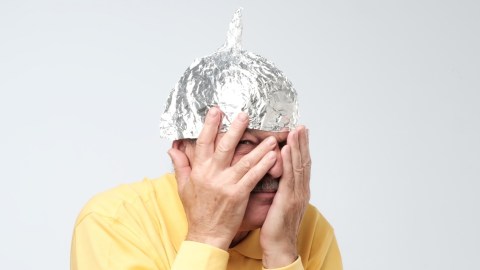People Who See Themselves as Unique Are Drawn to Conspiracy Theories

Image source: Koldunov/Shutterstock
Two opposite statements, both of them true:
- We’re all the same — We all crave the same things: shelter, food, company and comfort, and we’re all here for just a little while.
- You’re unique — The specific details of your life are not the same as anyone else’s.
Most people understand and accept this paradox. And yet a study recently published in Social Psychology has found that the more you relate to the second statement—and the less you care about the first—the more likely you are to believe in hidden, malevolent forces at work. It has to do with the way an “I see something other people can’t see” attitude reinforces the idea that one is exceptionally perceptive, and unique.
The research—a trio of studies—was conducted by Anthony Lantian, Dominique Muller, Cécile Nurra, and Karen M. Douglas at Grenoble Alps University.
Test 1

The first test was designed to confirm or refute the researchers’ prediction that “high believers in conspiracy theories assume that they possess information that other people do not have about the events in question.” There were 190 French subjects — with an average age of 24.85, and 117 of whom were female — who responded to online questionnaires in exchange for entry in a gift-card lottery. 63.2% of the respondents were students.
There were two rounds of questions.
- In the first round, the researchers were looking to identify those of their subjects who believed in conspiracies. Using a scale of 1-completely false to 9-completely true, subjects were asked how they felt about the statement, “The assassination of John F. Kennedy was not committed by the lone gunman, Lee Harvey Oswald, but was rather a detailed, organized conspiracy to kill the president.”
- The goal of the second round was to determine the degree to which believers were basing their opinions on access to information they felt others didn’t have. They were asked to respond to, “The information I used to answer questions asked in the previous Section 1 are: “using a scale of 1-disclosed to the public view to 9-hidden from public view.
Confirming their initial hypothesis, the researchers found that the more strongly respondents believed in the Kennedy assassination conspiracy, the “more they thought they possessed scarce information.”
Test 2

(ZORISLAV STOJANOVIC)
This test looked at subjects who had a need to see themselves as special, to find out if it was true that “people with a chronic high need for uniqueness believe in conspiracy theories to a larger extent.” They studied 208 participants—average age, 32.44, and 96 female—who worked for Amazon Mechanical Turk in the U.S. Again, the online test had two phases.
- First, the researchers identified subjects with a need for feeling special using a questionnaire based on the Need for Uniqueness Scale (Snyder and Fromkin, 1977). The respondents’ scale of responses went from 1-Strong disagreement to 5-Strong agreement.
- Next, subjects responded to a variety of conspiracy-related statements—none of which used the word “conspiracy” so as to avoid tipping the researchers’ hand—to assess their affinity for conspiracy theories, with a scale of 1-Definitely not true to 5-Definitely true. Included were statements such as, “A lot of important information is deliberately concealed from the public out of self-interest,” and, “I think that the official version of the events given by the authorities very often hides the truth.”
Here again, the researchers’ suspicions were borne out: “a higher need for uniqueness… was associated with higher belief in conspiracy theories…”
Test 3

(ROBIN BILES)
In the final test, researchers wanted to see if a newly developed sense of specialness also produced a proclivity for conspiracy theories. That is, “people for whom a high need for uniqueness is activated should manifest higher conspiracy beliefs than people for whom a lower need for uniqueness is activated.” There were 143 French psychology undergraduates in the final study—age 20.93, and 121 female. A pair of two-part sessions were held. The second was 15 days after the first, and with different testers so the subjects wouldn’t be aware this was a followup to the first session.
- In the first session, the researchers began with an assessment of the subjects’ level of belief in conspiracies, employing a single-item conspiracy questionnaire (Lantian et al., 2016). Next, subjects were asked to respond to questions based on the Self-Attributed Need for Uniqueness (Lynn & Harris, 1997) scale. In this way, the researchers established baselines for each subject’s initial attraction to conspiracy theories and for how much they cared about being special.
- In the second session, subjects were tasked with writing about either the importance of individuality or conformity—the individuality assignment was designed to increase a desire for uniqueness, and the conformity writing was meant to reduce it (Cheema & Kaikati, 2010). Next, subjects read a fake news account of a fictional bus accident in Moldova, after which they were asked to rate their reaction to four statements. Two of the statements reflected a conspiratorial slant—“The coach crash was deliberately planned by the established power in the country”—and two did not—“This event is the result of an unfortunate accident due to uncontrollable factors [e.g., bad weather, mechanical failure, etc.]” Respondents used a scale of 1-Strongly disagree to 9-Strongly agree.
The researchers found that there was in fact a correlation between an attraction to conspiracy theories and a desire for specialness that had only been recently developed. The test’s conclusion wasn’t as decisive as the team had hoped, however, so a fourth, slightly altered study was run for validation.
You may be reminded of the old joke, “Just because I’m paranoid doesn’t mean they’re not out to get me,” which reminds us that every now and then a conspiracy theory does turn out to be true. By using the Kennedy assassination in one test, the researchers may have stepped into such a gray area, given that the facts in the case do seem somewhat unsettled.

(ÁLVARO IBÁÑEZ)
In any event, the next time one of us feels the seductive pull of a juicy conspiracy theory, we might stop and take moment: Are we really seeing something in the world that few others see, or are we just seeing something previously unsuspected about ourselves?





